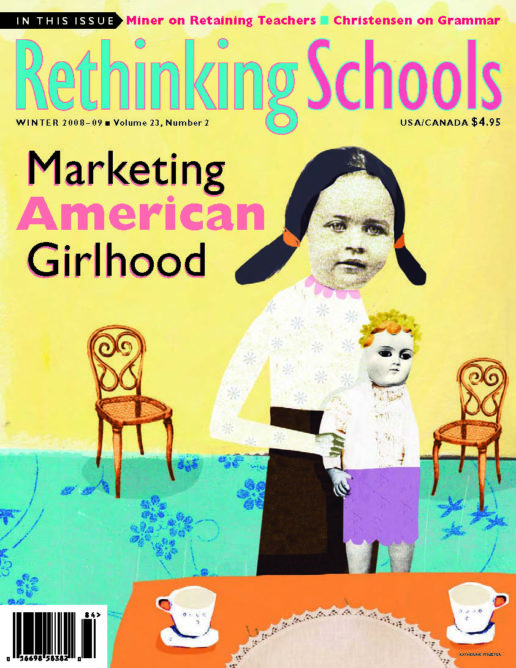Letters to the Editors 23.2
Thank you, Howard
Howard Zinn’s chapter on the Vietnam War (Vol. 22, No.1) was quite an eye opener for me. I knew some of the details leading up to the war but not the whole perspective as Zinn describes it. What a shameful history we have.
I graduated from a private conservative high school in 1969. We did not discuss the Vietnam War in class and we certainly did not discuss it at home. For this reason, I went through this period somewhat uninformed. I regret not knowing more about the reasons for the war at that time for I missed an opportunity to stand up for peace and justice.
This article and the others concerning war, recruitment by the military, and the perspective used in our history books are so timely. The protests over the Vietnam War were carried on the backs of enlightened students. If we are ever going to stop the United States’ aggressive interventions into other countries, it again will have to begin with our students. Thank you for some of the great ideas and resources to help teachers with this. This madness must cease.
— M. T. Cowley
LaGrange, Ky.
Dispelling Asian Myths
I wanted to thank you for publishing “You’re Asian, How Could You Fail Math?” (Vo1. 22, No. 2). It is unsettling to read how little has changed despite the larger population of Asian students in the classroom. I taught in a bilingual Chinese-English classroom for two years in the New York City system. The article’s inclusion of economics and income as a factor in discrimination resonated for me. Often I saw my students cope with being intimidated and mugged by black, Hispanic, and white students because they believed that they “had all the money.” However, in the same instance these non-Chinese students would make fun of the newly immigrated Chinese students because they did not wear the popular designer brands!
What made the situation more difficult was that my students were predominantly Fukienese and I am Cantonese. Just like the non-Chinese students assumed they had money, my students assumed that I had money. It was this draining cycle of false assumptions and disrespect. Teaching was a disappointing but eye-opening experience for me.
I am still involved in education issues that impact Asian American students. I stepped away from activism and promotion to hone my skills as a curriculum developer and program director. As frustrating as articles like this one are to read, I am glad there are teachers/writers voicing these ongoing discrepancies in schools.
— Vincent Young
www.cranialgunk.org
AFT Called Out
I recently received a letter from Edward J. McElroy, president of the American Federation of Teachers, detailing the AFT Executive Council’s endorsement of Hillary Clinton for president. The council’s praise of Clinton’s achievements, however, failed to utter a single word of concern about our illegal and immoral invasion and occupation of Iraq — a human catastrophe that has left an estimated one million people dead and driven another four million from their homes.
Since the Executive Council went through an “exhaustive process” before coming to its endorsement of Clinton, I asked McElroy whether the following items were considered:
(1) Clinton voted to give President Bush the authority to invade Iraq — in violation of the Constitution that gives war-making power to Congress alone.
(2) Despite Clinton’s claim that she’s been “a consistent critic [of the war] from the beginning” (New York Times, 8/10/06), she has voted for every appropriation bill to continue the conflict — a total of $611 billion thus far on the way to an estimated final cost of $2.5 trillion.
Her tactical criticisms are a calculated and insincere response to the Iraqi resistance and increasing domestic opposition. Voting for the U.S. invasion and every funding bill to continue it makes one a supporter — not a critic! Clinton does not oppose this criminal outrage; she merely questions how the crime is being committed.
(3) Clinton was silent as first lady, and then as senator supported the U.S.-led U.N. sanctions in Iraq that led to the deaths of hundreds of thousands of children. In stark contrast, Denis Halliday and Hans Von Sponeck, former U.N. Humanitarian Coordinators in Iraq, called these sanctions “genocidal” and resigned in protest. According to recent media reports, the sanctions and war have led to the worst increase in child mortality of any country on record. A recent Oxfam report states that the war has brought “extreme poverty” to Iraq, with its children “traumatized, malnourished and homeless.”
The AFT letter also asserted, “As a private citizen, as first lady…and as a U.S. Senator, …Clinton has been committed to improving the lives of children and working men and women.” Huge improvements could have been made if the funds used in the invasion and occupation of Iraq were used to address the staggering inequality and poverty our children face in schools and social life. Based on U.S. population figures and the current ($611 billion) and estimated total cost of the war ($2.5 trillion), the people of Milwaukee, for example, have paid out some $1.2 billion thus far of their final bill of $5 billion for the conflict.
Think of what life-affirming programs could be created and sustained for the children of the U.S. with the funds now being lost to violence and devastation — every dollar of which has been approved by Hillary Clinton, the presidential candidate endorsed by the American Federation of Teachers.
— John Marciano,
Professor Emeritus,
State University of New York, College at Cortland
United University Professions/AFT Local 2190
Santa Monica, Calif.

